Struggling with loose implant-retained dentures? Over time, locator caps on implant-supported dentures can wear out, leading to a frustrating lack of stability. For some, the frequent need for replacements can get expensive. However, using a strong denture adhesive can be a game-changer, offering a quick and affordable way to improve the fit—even for dentures made of materials like zirconia.
This article explores why implant-retained dentures can become loose, how to temporarily tighten them with adhesive, and tips for long-term maintenance. Whether you’re new to implant dentures or looking for ways to extend the life of your locator caps, these solutions will help you regain confidence and comfort.
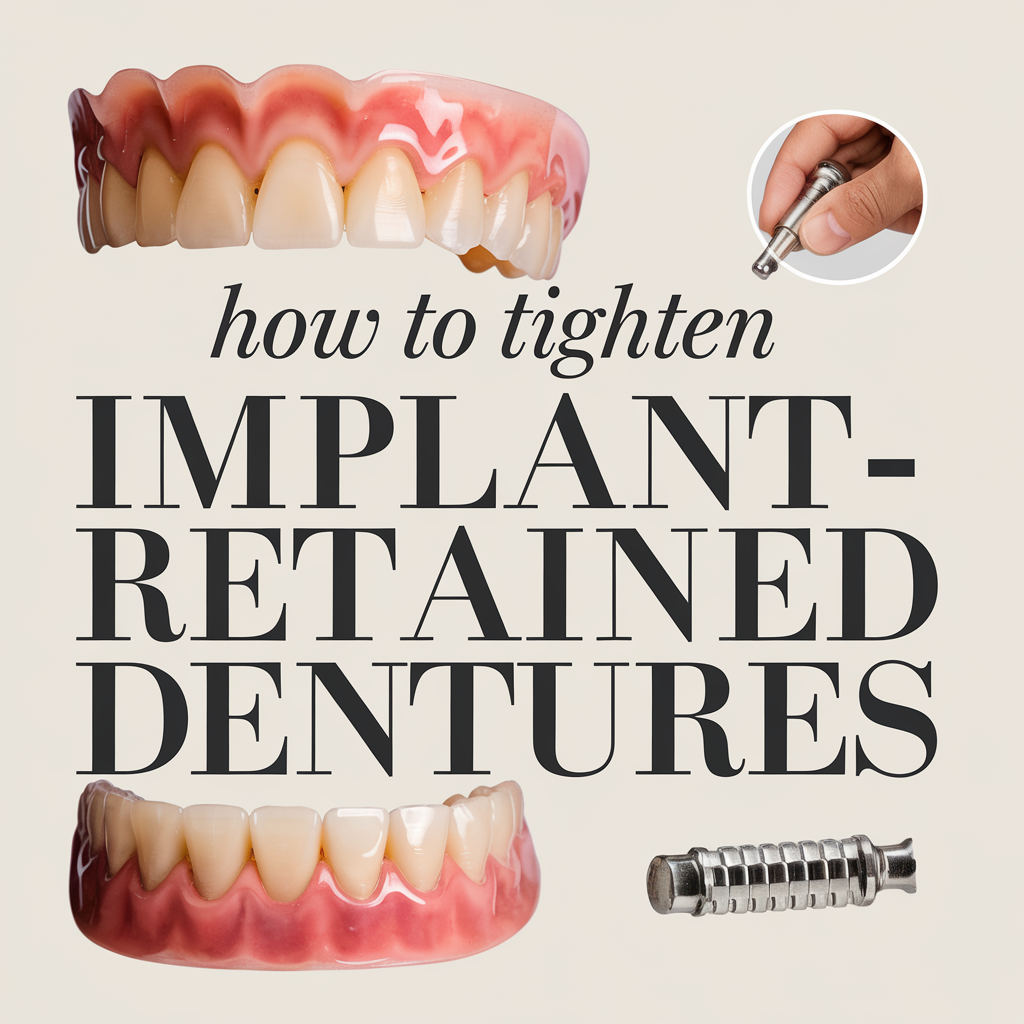
Why Are My Snap-In Dentures So Darn Loose?
Snap-in dentures, also known as implant-retained overdentures, are designed to stay securely in place using locator caps and abutments. However, over time, these dentures may become loose, making daily wear uncomfortable.
Common Causes of Loose Implant Overdentures:
- Worn-Out Locator Caps: The rubber components in locator caps degrade with regular use, reducing their grip.
- Gum and Bone Changes: Natural changes in your jawbone or gums after implant placement can affect the fit of your dentures.
- Debris Build-Up: Food particles or plaque in the locator sockets can prevent a snug fit.
- Improper Maintenance: Lack of regular cleaning or replacing worn parts can lead to instability.
If you’re experiencing looseness, it’s essential to identify the cause. For a professional breakdown of what might be happening and potential solutions, check out this teledentistry guide to fixing loose locator dentures.
Understanding the root cause of the problem can help you decide whether to pursue a temporary fix, like using denture adhesive, or seek professional adjustments.
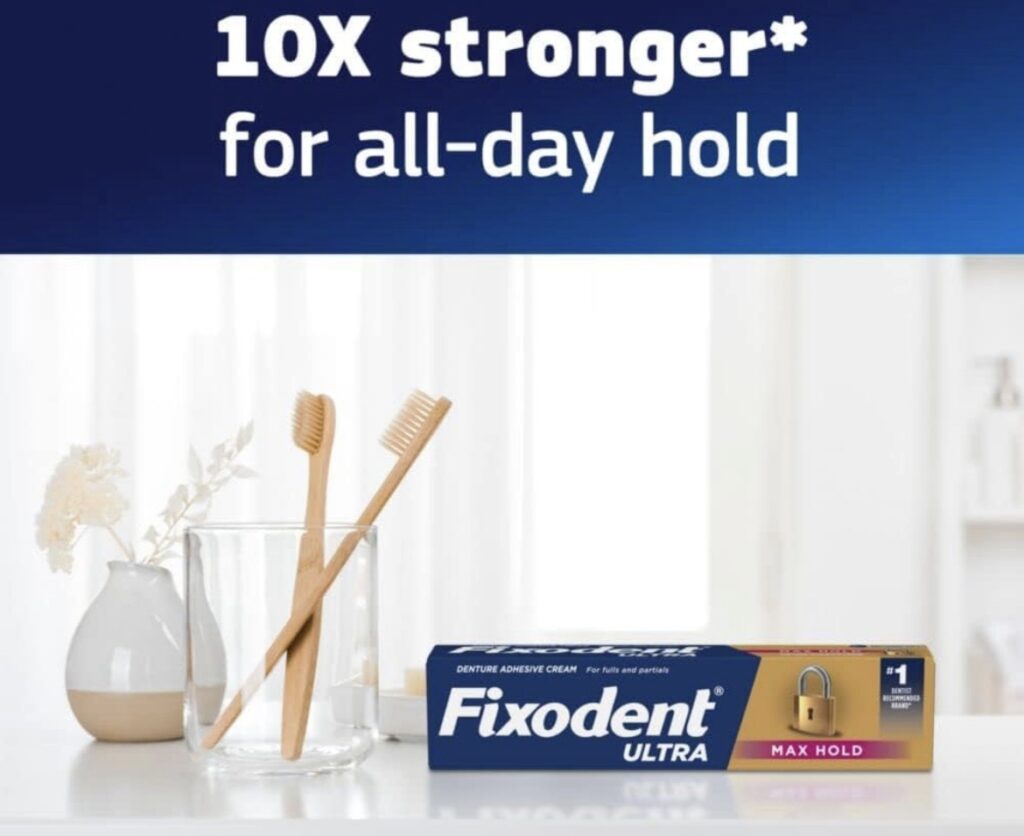
Can I Use Denture Adhesive With Implant-Retained Dentures?
Yes, denture adhesive can be used with implant-retained dentures, and it’s a practical solution for improving stability, especially if your locator caps are starting to wear out. While adhesives don’t replace the need for maintenance or replacement parts, they provide a temporary fix to keep your dentures snug and secure.
Why Adhesive Works, Even for Zirconia Dentures:
Materials like zirconia are known for their durability and resistance to adhesion, but high-strength adhesives like Fixodent Ultra Max Hold are formulated to work effectively on a variety of denture materials. When applied to both the gum-facing part of the denture and inside the locator sockets, it can create a tighter fit for up to 24 hours.
Advantages of Using Adhesive:
- Helps reduce movement and improve chewing stability.
- Can delay the need for frequent and costly locator cap replacements.
- Provides a confidence boost for those dealing with loose dentures.
While denture adhesive is a quick fix, it’s not a long-term solution. If your dentures frequently become loose, consider replacing worn locator caps like Locator Male Extended Range caps or consulting your dentist for adjustments.
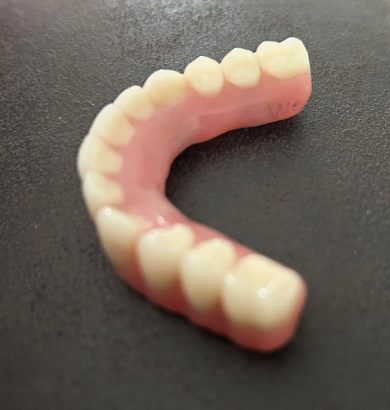
How to Tighten Loose Locator Dentures With Adhesive!
Using denture adhesive to tighten implant-retained dentures is a simple and effective temporary fix. When applied correctly, it can provide a snug, stable fit for up to 24 hours, even for materials like zirconia. Here’s how to do it:
Step-by-Step Guide to Using Adhesive
- Clean Your Dentures and Locators Thoroughly:
- Remove any food particles or debris from your dentures and locator abutments.
- Use a soft brush and non-abrasive cleaner to avoid damaging the locator caps.
- For in-depth cleaning advice, refer to this guide on cleaning implant-retained dentures.
- Apply Adhesive to Key Areas:
- Spread a small amount of adhesive, like Fixodent Ultra Max Hold, inside the locator sockets on the dentures.
- Add a thin layer to the gum-facing portion of the denture for extra hold.
- Snap the Denture Into Place:
- Align the denture with the implants and press firmly to engage the locators.
- Hold in place for a few seconds to allow the adhesive to bond securely.
- Enjoy a Secure Fit:
- The adhesive will help reduce movement and create a more stable fit, giving you confidence throughout the day.
Pro Tip:
While adhesive is a great temporary solution, replacing worn locator caps is essential for maintaining long-term stability. Consider affordable options like Locator Male Extended Range caps for a reliable upgrade.
By following these steps, you can regain comfort and functionality in your dentures without immediate professional intervention.
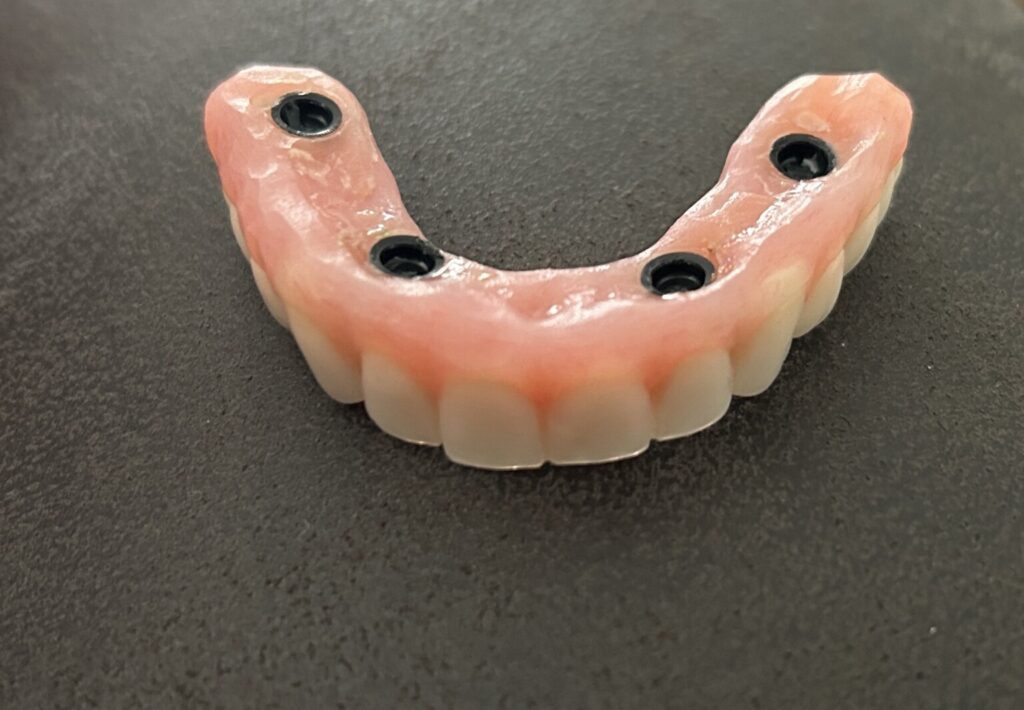
What Causes Loose Implant Overdentures Over Time? Why Oh Why!
Over time, implant-retained overdentures may lose their snug fit due to wear and tear, physical changes in your mouth, or maintenance issues. Understanding the underlying causes can help you take proactive steps to address the problem.
Key Reasons for Loose Implant Overdentures:
- Worn Locator Caps:
- The locator caps, made of durable rubber or nylon, wear out with regular use, reducing their grip on the abutments.
- Frequent snapping in and out accelerates wear, making periodic replacement essential.
- Changes in Gum or Bone Structure:
- After implant placement, gradual bone resorption or gum shrinkage may affect how securely the dentures fit.
- Debris in the Locators:
- Food particles or plaque buildup in the locator sockets can prevent proper attachment, leading to looseness.
- Improper Cleaning:
- Failing to clean the locators and dentures regularly can shorten the lifespan of the components.
Addressing the Issue:
- Regular cleaning and maintenance can extend the life of locator caps and prevent debris from affecting the fit.
- Replace locator caps promptly when wear is noticeable. For guidance, check out this locator troubleshooting video for professional advice.
If the problem persists despite cleaning and maintenance, consider consulting your dentist for adjustments or a possible replacement of the locator abutments. Temporary solutions like denture adhesive can help, but addressing the root cause is key to long-term comfort.
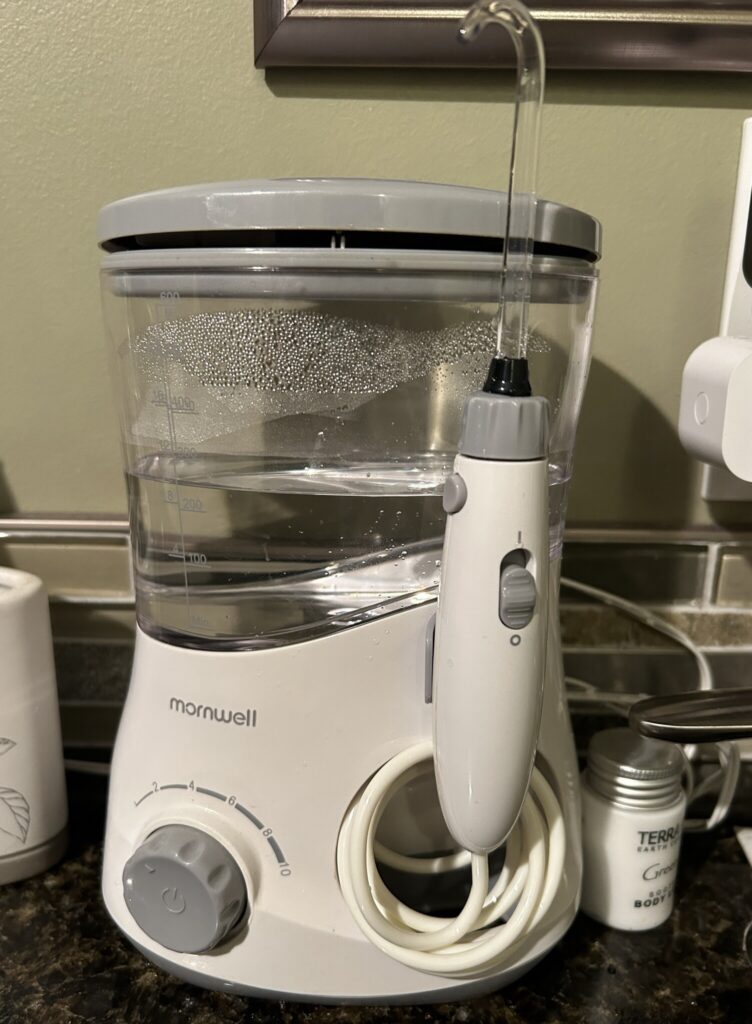
Maintaining Locator Abutments and Caps
Proper maintenance of locator abutments and caps is essential for keeping your implant-retained dentures secure and functioning optimally. Regular care not only extends their lifespan but also prevents the discomfort caused by loose dentures.
How Long Do Locator Abutments Last?
- Locator abutments are designed to last several years with proper care. However, wear and tear on the locator caps that connect to these abutments can cause dentures to loosen over time.
- Caps typically need replacement every 6–12 months, depending on usage and oral hygiene practices.
How to Tighten Locator Abutments:
- While you can’t tighten abutments at home, your dentist can adjust or replace them to improve fit. Regular dental checkups ensure that the abutments remain securely attached to the implants.
Tips for Maintaining Locator Components:
- Clean Daily:
- Use a soft toothbrush or interdental brush to clean around the locator abutments and denture caps.
- Remove your dentures nightly and clean them thoroughly to prevent buildup.
- Learn more about best practices with this guide to cleaning implant-retained dentures.
- Inspect Regularly:
- Check the caps for signs of wear, such as reduced grip or visible damage.
- Replace worn caps promptly to prevent unnecessary stress on the abutments.
- Replace Locator Caps:
- Affordable replacement options, such as Locator Male Extended Range caps, make it easy to refresh your denture’s fit without costly repairs.
When to Seek Professional Help:
If you notice persistent looseness or difficulty snapping your dentures into place, it’s time to visit your dentist. Professional adjustments or part replacements can restore your dentures to their original stability and comfort.
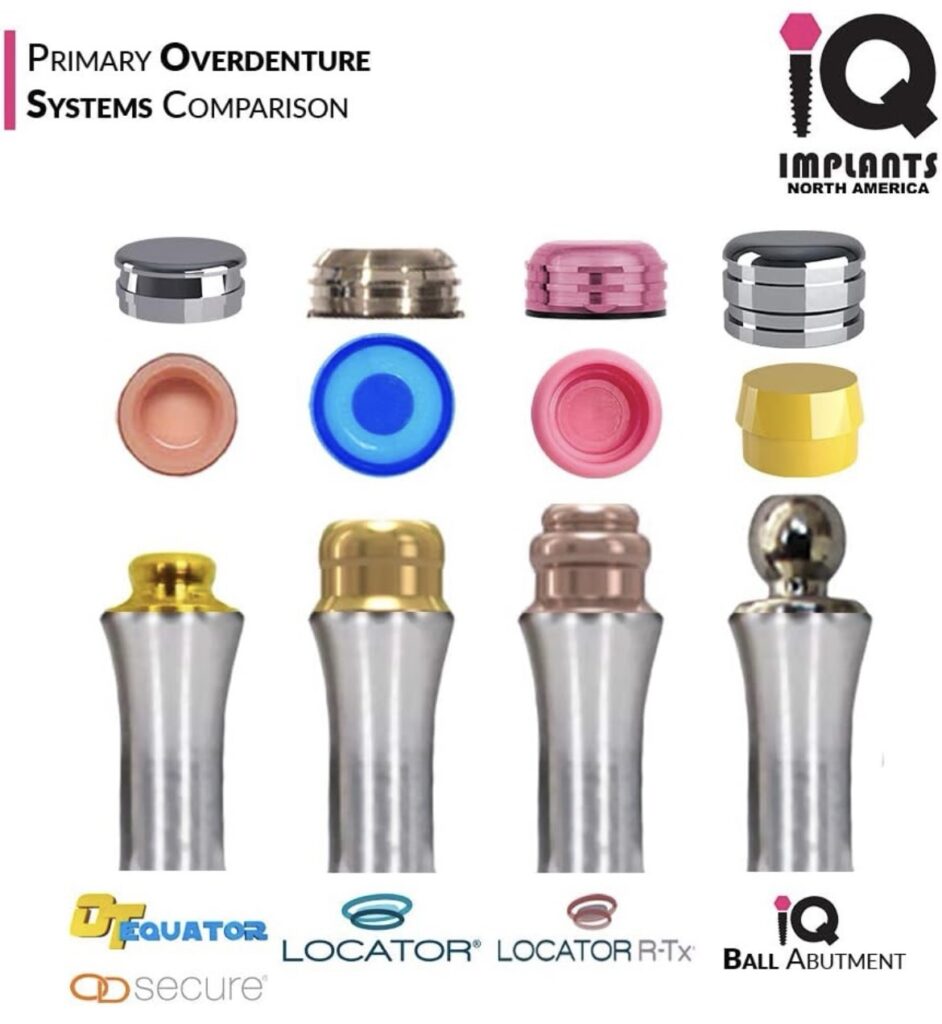
Replacing Locator Caps: A Guide
Replacing locator caps is a straightforward process that can make a significant difference in the stability of your implant-retained dentures. While a dentist can perform the replacement, many individuals prefer to do it themselves at home using affordable replacement kits.
When to Replace Locator Caps
- Signs of Wear: If your dentures feel loose or the snapping mechanism is weak, it’s time to replace the caps.
- Every 6–12 Months: Regular replacements are recommended to maintain a secure fit, especially with frequent use.
How to Replace Locator Caps at Home
- Gather Tools:
- Purchase a replacement kit like Locator Male Extended Range caps, which includes the caps and tools needed for installation.
- Remove the Worn Cap:
- Use the removal tool provided in your kit or a small pick to carefully extract the old locator cap from the denture housing.
- Insert the New Cap:
- Place the new cap into the housing and press it firmly until it clicks into place.
- Test the Fit:
- Snap your denture onto the implants to ensure a secure connection. Adjust as needed.
Why Regular Replacement Matters
Worn caps not only affect denture stability but can also cause excess pressure on the locator abutments, potentially shortening their lifespan. Keeping caps in good condition ensures long-term comfort and functionality.
If you’re unsure about replacing locator caps on your own, consult a dentist or watch this troubleshooting video for professional guidance. Regular maintenance and timely replacements are key to keeping your dentures secure and reliable.
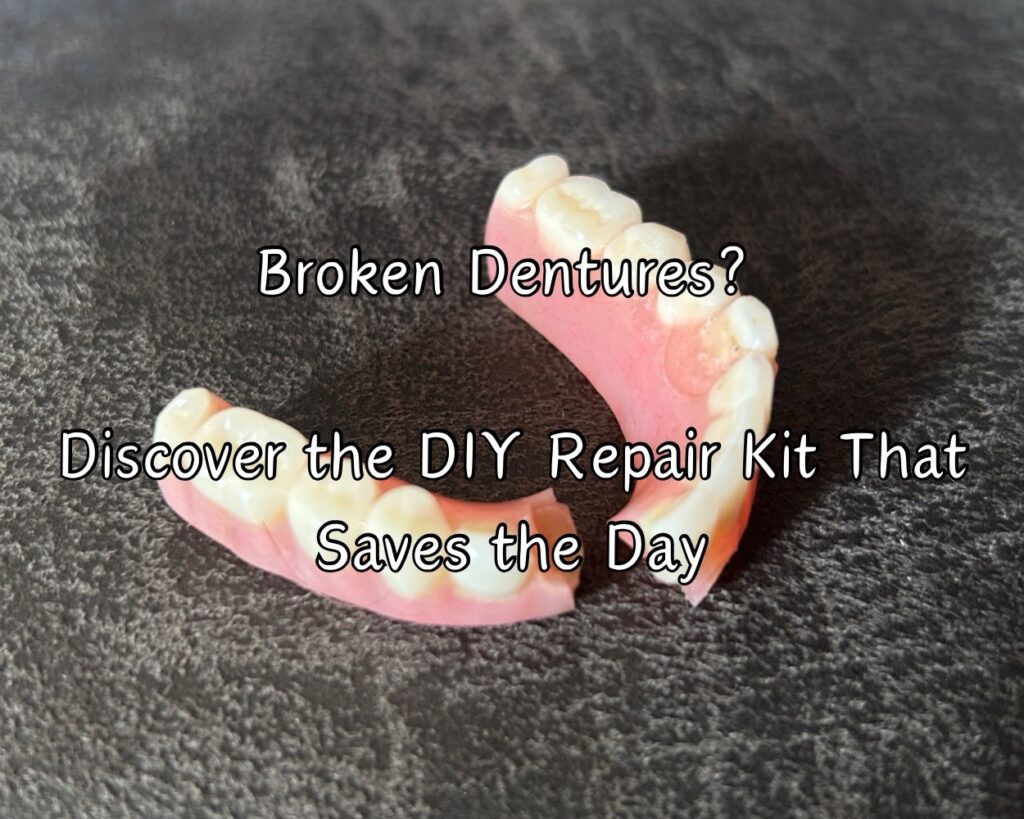
Common Problems With Implant-Retained Dentures and Solutions
While implant-retained dentures offer exceptional stability and comfort, they can sometimes present challenges. Understanding these issues and their solutions can help you maintain a better fit and long-lasting functionality.
Frequent Problems With Implant-Retained Dentures:
- Looseness:
- Worn-out locator caps or debris in the abutments can cause dentures to feel unstable.
- Temporary fix: Use a strong adhesive like Fixodent Ultra Max Hold for added grip.
- Long-term solution: Replace worn locator caps with affordable options like Locator Male Extended Range caps.
- Difficulty Snapping In:
- Debris or improper alignment can make it hard to snap the denture into place.
- Solution: Clean the abutments and caps thoroughly with a soft brush or an interdental cleaner.
- Discomfort or Irritation:
- Improper fit or pressure points can lead to sore spots on the gums.
- Solution: Visit your dentist for adjustments to the denture base or locator alignment.
- Component Wear and Tear:
- Over time, abutments and locator caps degrade, reducing their effectiveness.
- Solution: Replace components as needed and schedule regular dental checkups.
Considering Long-Term Alternatives:
For those experiencing ongoing issues with locator dentures, upgrading to a more permanent solution like All-on-4 dental implants might be worth exploring. This approach offers enhanced stability and eliminates many common issues associated with locator systems.
By addressing these problems proactively, you can keep your implant-retained dentures functioning comfortably and reliably.

Long-Term Care for Implant-Retained Dentures
Maintaining implant-retained dentures requires consistent care to ensure their longevity and effectiveness. Proper cleaning and routine maintenance not only keep your dentures secure but also help prevent discomfort and costly repairs down the line.
Daily Cleaning Routine
- Remove and Rinse:
- Take out your dentures nightly and rinse them under lukewarm water to remove food particles and debris.
- Brush Thoroughly:
- Use a soft-bristled brush and a non-abrasive cleaner to gently scrub the denture and locator caps.
- Clean around the implant abutments in your mouth to prevent plaque buildup.
For more tips on maintaining impeccable hygiene, check out this guide to cleaning implant-retained dentures.
Regular Maintenance Practices
- Inspect for Wear: Periodically check locator caps and abutments for signs of damage or reduced grip.
- Replace Worn Components: Swap out locator caps every 6–12 months or as needed. Affordable replacements like Locator Male Extended Range caps make this process simple.
- Schedule Checkups: Visit your dentist every 6 months to ensure the implants and components are functioning correctly.
Protecting Your Dentures
- Avoid Harsh Products: Steer clear of bleach or abrasive cleaners that can weaken the locator caps or denture base.
- Handle With Care: When cleaning or removing your dentures, work over a soft surface like a towel to prevent damage if dropped.
Considering Repairs or Upgrades
If damage occurs or components fail frequently, consult your dentist about repairs or explore permanent solutions like All-on-4 dental implants for greater stability.
By following these long-term care practices, you can extend the life of your implant-retained dentures and ensure a comfortable, reliable fit every day.
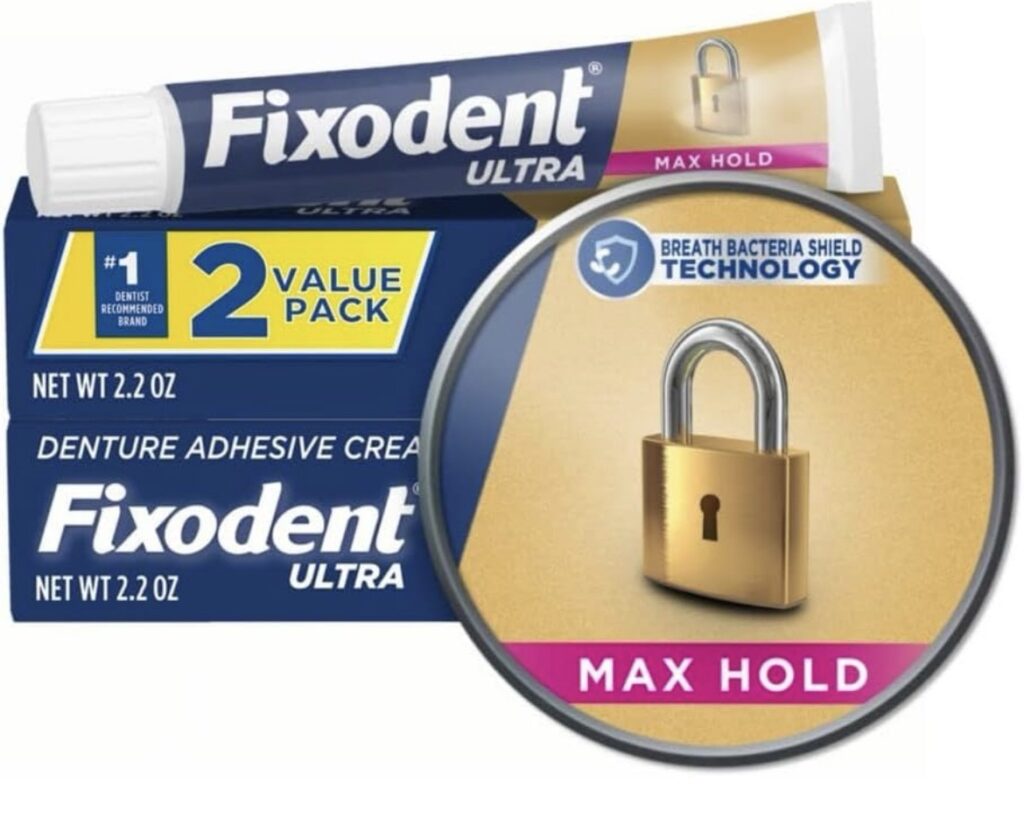
Implant-retained dentures are a fantastic solution for stability and function, but like any dental appliance, they require regular care and occasional adjustments. Loose locator caps, wear and tear, or gum changes can all impact their fit, but simple fixes like using Fixodent Ultra Max Hold or replacing locator caps with Locator Male Extended Range caps can provide immediate relief.
For long-term success, proper cleaning and maintenance are key. Regularly inspecting and replacing components, keeping your dentures clean, and scheduling routine checkups with your dentist will keep your dentures working as intended. If you’re facing recurring issues, consider consulting with your dentist about more permanent options like All-on-4 dental implants.
By combining temporary solutions with good maintenance practices, you can enjoy the confidence and comfort that implant-retained dentures are designed to provide. Don’t let minor inconveniences keep you from making the most of your smile—simple tweaks can make a big difference!
As an Amazon Associate we earn from qualifying purchases through some links in our articles.




